第十三课时 八年级上(Units6-8)教材精讲精练课件—鲁教版中考英语一轮复习
文档属性
| 名称 | 第十三课时 八年级上(Units6-8)教材精讲精练课件—鲁教版中考英语一轮复习 | 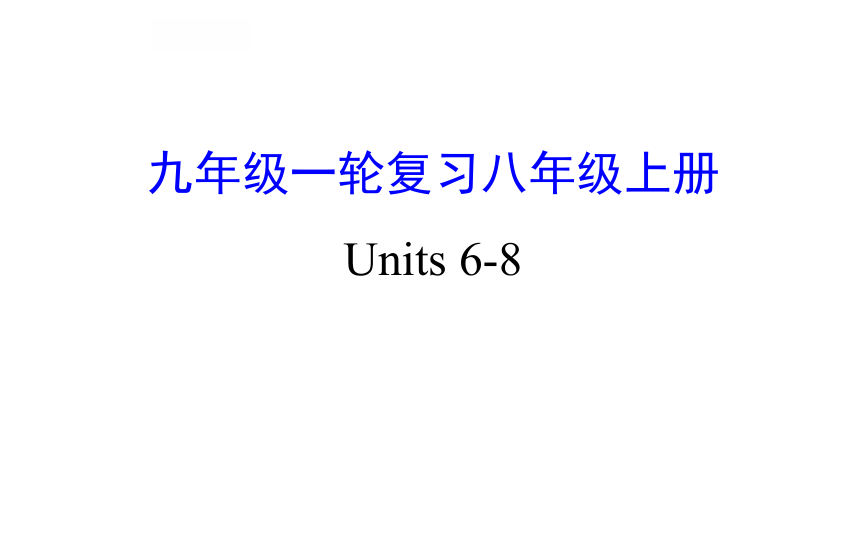 | |
| 格式 | zip | ||
| 文件大小 | 399.3KB | ||
| 资源类型 | 试卷 | ||
| 版本资源 | 鲁教版 | ||
| 科目 | 英语 | ||
| 更新时间 | 2023-05-06 09:19:40 | ||
图片预览

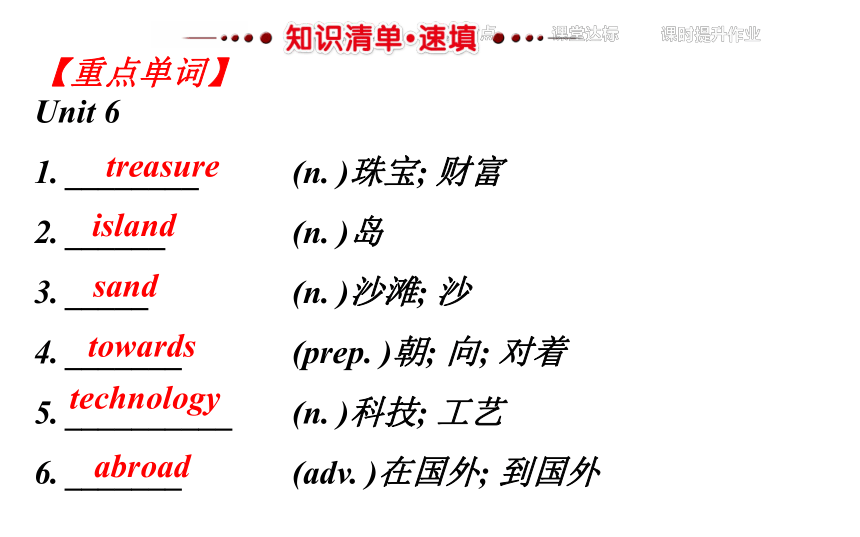

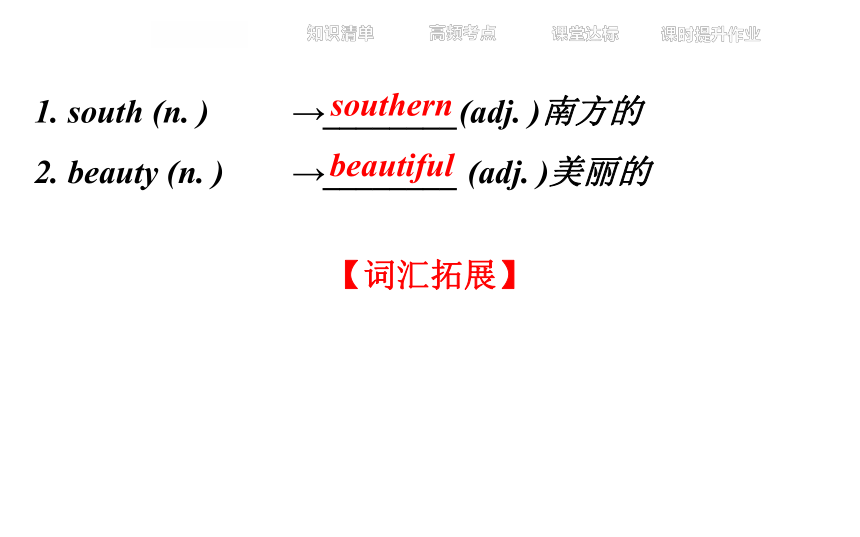
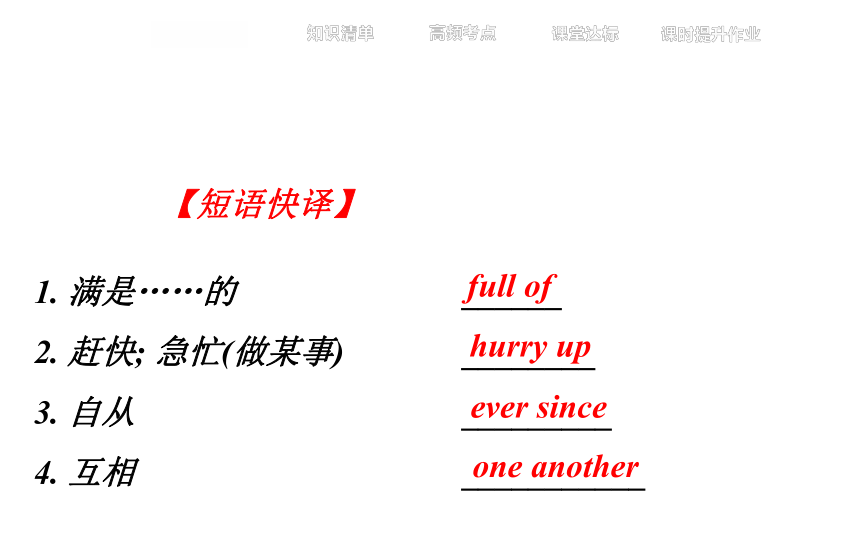
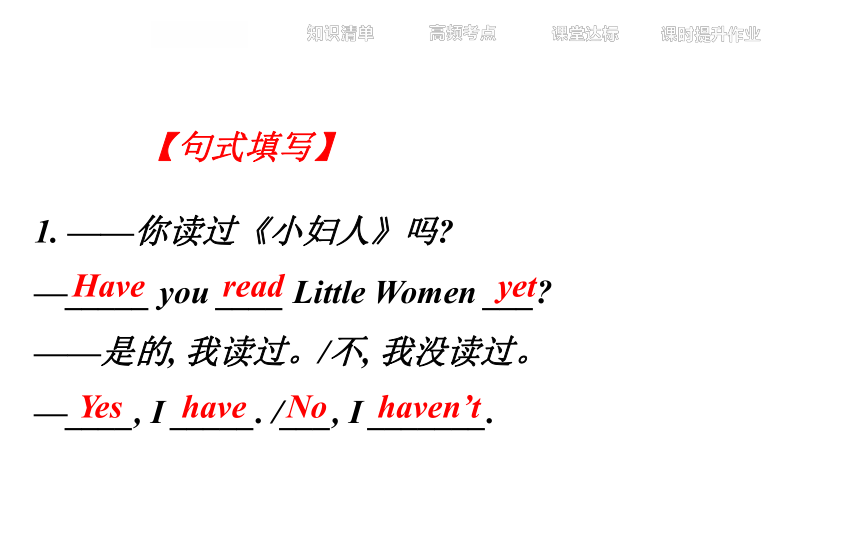
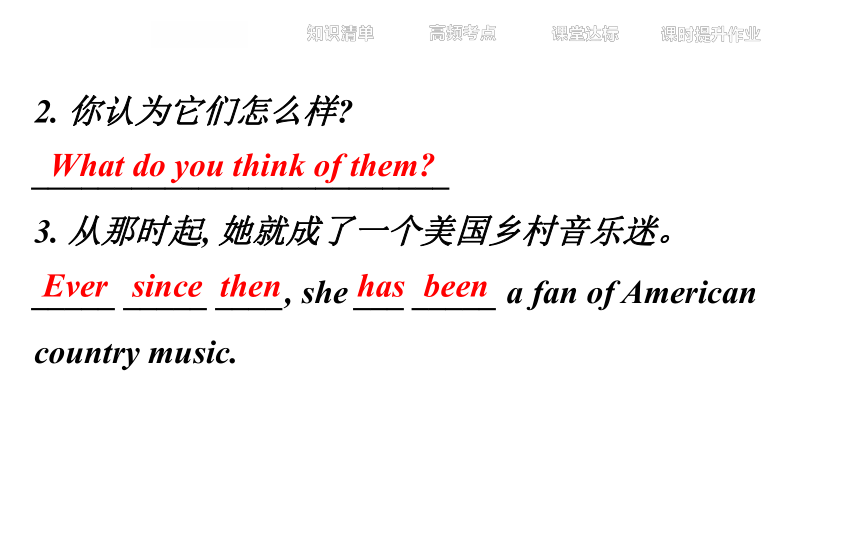
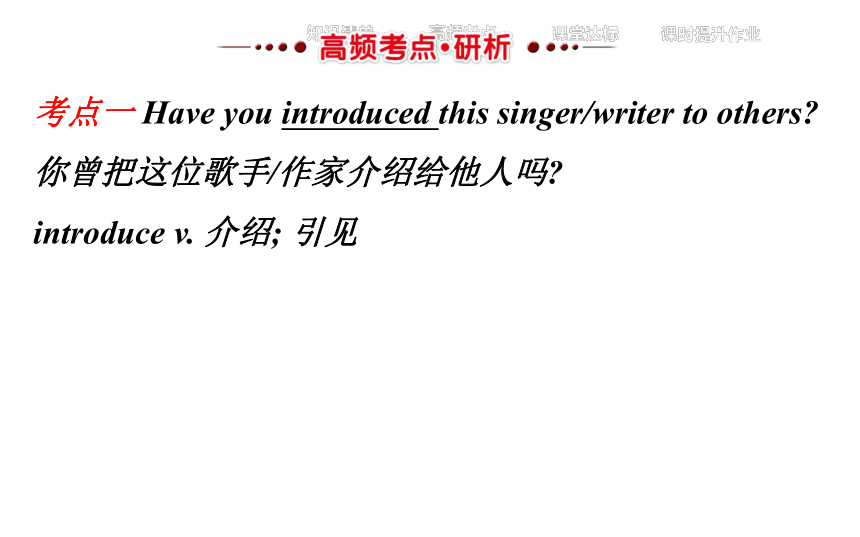
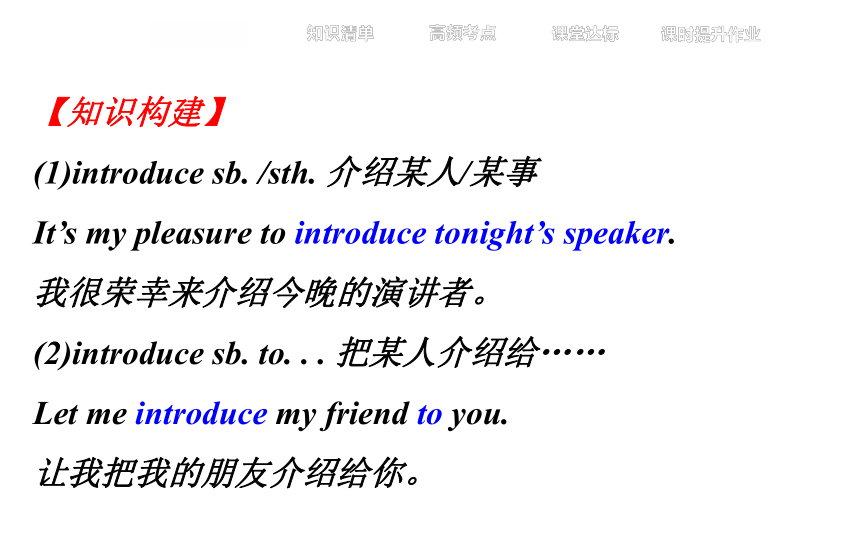
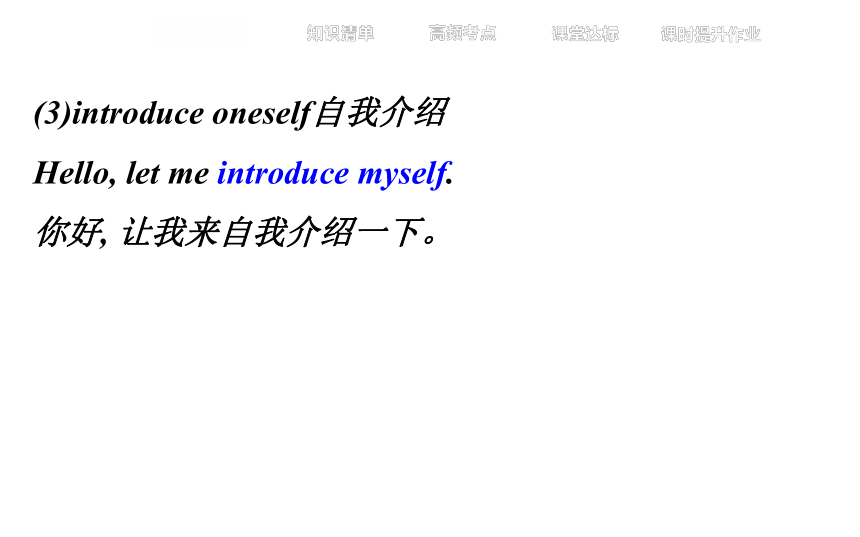
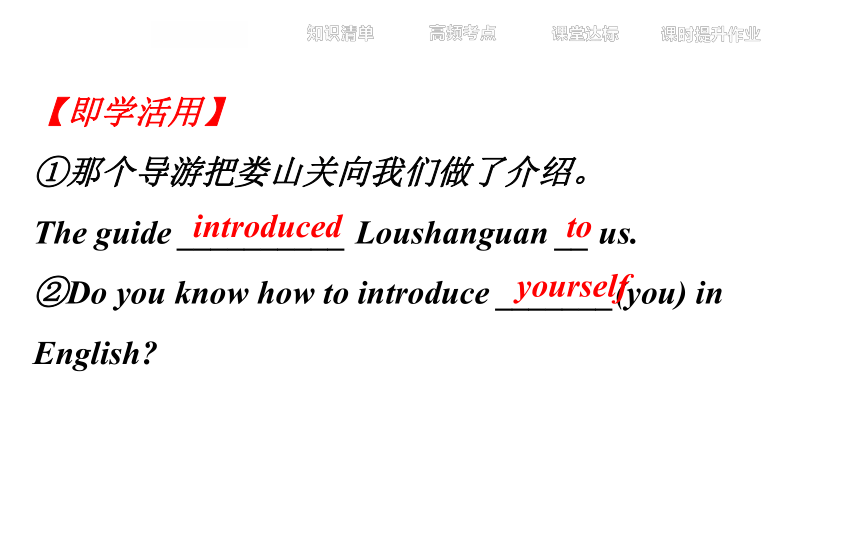
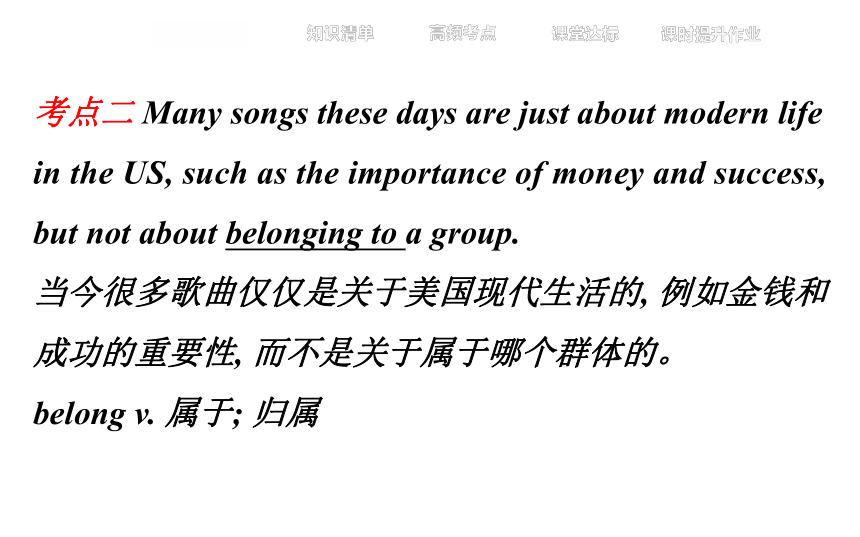
文档简介
(共91张PPT)
九年级一轮复习八年级上册
Units 6-8
Unit 6
1. ________ (n. )珠宝; 财富
2. ______ (n. )岛
3. _____ (n. )沙滩; 沙
4. _______ (prep. )朝; 向; 对着
5. __________ (n. )科技; 工艺
6. _______ (adv. )在国外; 到国外
treasure
island
sand
towards
technology
abroad
【重点单词】
7. _______ (adv. )真实地; 事实上
8. _______ (adj. )现代的; 当代的
9. ______ (v. )属于; 归属
10. _______ (num. )一百万
11. ______ (n. )唱片; 记录; (v. )录制; 录(音)
12. _________ (v. )介绍; 引见
actually
modern
belong
million
record
introduce
1. south (n. ) →________(adj. )南方的
2. beauty (n. ) →________ (adj. )美丽的
southern
beautiful
【词汇拓展】
1. 满是……的 ______
2. 赶快; 急忙(做某事) ________
3. 自从 _________
4. 互相 ___________
full of
hurry up
ever since
one another
【短语快译】
1. ——你读过《小妇人》吗
—_____ you ____ Little Women ___
——是的, 我读过。/不, 我没读过。
—____, I _____. /___, I _______.
Have
read
yet
Yes
have
No
haven’t
【句式填写】
2. 你认为它们怎么样
_________________________
3. 从那时起, 她就成了一个美国乡村音乐迷。
_____ _____ ____, she ___ _____ a fan of American
country music.
What do you think of them
Ever
since
then
has
been
考点一 Have you introduced this singer/writer to others
你曾把这位歌手/作家介绍给他人吗
introduce v. 介绍; 引见
【知识构建】
(1)introduce sb. /sth. 介绍某人/某事
It’s my pleasure to introduce tonight’s speaker.
我很荣幸来介绍今晚的演讲者。
(2)introduce sb. to. . . 把某人介绍给……
Let me introduce my friend to you.
让我把我的朋友介绍给你。
(3)introduce oneself自我介绍
Hello, let me introduce myself.
你好, 让我来自我介绍一下。
【即学活用】
①那个导游把娄山关向我们做了介绍。
The guide __________ Loushanguan __ us.
②Do you know how to introduce _______(you) in
English
introduced
to
yourself
考点二 Many songs these days are just about modern life in the US, such as the importance of money and success, but not about belonging to a group.
当今很多歌曲仅仅是关于美国现代生活的, 例如金钱和成功的重要性, 而不是关于属于哪个群体的。
belong v. 属于; 归属
【知识构建】
(1)belong不能用于进行时、被动语态, 常用于动词短语belong to, 意为“属于; 归属”, 其中to为介词, 后跟名词或代词。
(2)belong to sb. 常可与“be+名词性物主代词/名词所有格”进行替换。
The Porsche belongs to the woman next door.
这辆保时捷是隔壁那个女人的。
She belongs to the school computer club.
她是学校计算机俱乐部的成员。
【误区警示】belong to后不可接人称代词主格、名词性物主代词或名词所有格。
【即学活用】
I think the ruler is Tom’s. (改为同义句)
I think the ruler _______ __ Tom.
belongs
to
考点三 He’s sold more than 120 million records.
他已经卖了1. 2亿多张唱片。
million num. 一百万
【知识构建】
(1)million与具体基数词连用时用单数, 表示具体数。
(2)million与of连用时用复数, 表示笼统数, 意为“数以百万计的”。
He would like to pay two million dollars. 他愿意支付200万美元。
A careless mistake cost the company millions of pounds.
一个粗心的错误使这家公司蒙受数百万英镑的损失。
【即学活用】
①The Great Wall is famous, so every year _______ people come to visit it.
A. million B. million of C. millions of
【解析】选C。考查数词。句意: 长城很出名, 所以每年有数以百万计的人来参观。此处表示的是笼统数, millions of表示“数以百万计的”。故选C。
②三百多万人来自乡下。
More than _____ _______people are from the
countryside.
three
million
【重点单词】
Unit 7
1. _______ (n. )照相机; 摄影机; 摄像机
2. ________ (v. & n. )进步; 进展
3. _________ (v. )鼓励
4. _____ (adj. )社会的
5. ________ (n. )省份
camera
progress
encourage
social
province
6. ____ (v. & n. )害怕; 惧怕
7. ________ (conj. )不管……(还是); 或者……(或者);
是否
8. _________ (conj. )在任何……的时候; 无论何时
fear
whether
whenever
Unit 8
9. _____ (adj. )甜蜜的; 甜的; 含糖的
10. ___________ (n. )记忆; 回忆
11. _____ (n. )围巾; 披巾; 头巾
12. _______ (n. )铁路; 铁道
13. ______ (adj. )某种; 某事; 某人
14. _________ (n. )家乡; 故乡
sweet
memory
scarf
railway
certain
hometown
15. ______ (v. & n. )搜索; 搜查
16. ______ (prep. )在(其)中; ……之一
17. ______ (n. )羞耻; 羞愧; 惭愧
18. ______ (v. )将……认为; 把……视为; 看待
19. _______ (n. )百年; 世纪
20. ___________(prep. )与……相对; 在……对面
(adj. )对面的; 另一边的
search
among
shame
regard
century
opposite
21. _________ (adv. )尤其; 特别; 格外
22. _________ (n. )童年; 幼年
23. ___________ (v. )注视; 仔细考虑
especially
childhood
consider
【词汇拓展】
1. amuse (v. ) →__________ (n. )娱乐; 游戏
2. invent (v. ) →_________ (n. )发明; 发明物
→________ (n. )发明家
3. believe(v. ) →_________ (adj. )可信的
→___________ (adj. )难以置信的; 不真实的
4. usual(adj. ) →_______(adj. )特别的; 不寻常的
amusement
invention
inventor
believable
unbelievable
unusual
5. peace (n. ) →________ (adj. )和平的; 安宁的
6. perform (v. ) →___________ (n. )表演; 演出
7. it pron. →_____ pron. (it的反身代词)它自己
8. collect (v. ) →_________(n. )收集; 收藏品
9. safe (adj. ) →_____(adv. )安全地; 无危险地
→______ (n. )安全
10. simple (adj. ) →______ (adv. )仅仅; 只; 不过
peaceful
performance
itself
collection
safely
safety
simply
11. India (n. ) →______ (adj. )印度的(n. )印度人
12. Japan (n. ) →________ (adj. )日本的; 日本人的;
日语的 (n. )日本人; 日语
13. most (adj. ) →______(adv. )主要地; 通常
14. make (v. ) →______ (n. )生产者; 制订者
15. own (v. ) →______ (n. )物主
Indian
Japanese
mostly
maker
owner
16. true(adj. ) →_____ (n. )事实; 真相
→_______(adj. )诚实的; 真实的
→_________ (adv. )诚实地; 真实地
17. hold(v. ) →____ (过去式)
→____(过去分词)拥有; 抓住
truth
truthful
truthfully
held
held
【短语快译】
1. _______________ 游乐场
2. ______ 茶艺
3. ______ 茶具
4. __________ 两个; 一对; 几个
5. ___________ 数以千计的; 许许多多的
6. ___________________________________
一方面……另一方面……
amusement park
tea art
tea set
a couple of
thousands of
on the one hand. . . on the other hand. . .
7. _____________ 全年
8. ________ 庭院拍卖会
9. _________ 查看; 观察
10. ___________ 棋类游戏
11. ________________ 初级中学
12. ________ 清理; 丢掉
13. _________ 不再; 不复
all year round
yard sale
check out
board game
junior high school
clear out
no longer
14. ________ 放弃、交出(尤指不舍得的东西)
15. ______ 至于; 关于
16. ___________ 说实在的
17. ___________ 依据; 按照
18. ___________ 几乎; 接近
part with
as for
to be honest
according to
close to
【句式填写】
1. ——你曾去过科学博物馆吗
—_____you ever _____ __ a science museum
——不, 我没去过。
—___, I _______.
Have
been
to
No
haven’t
2. ——我从未去过水上公园。
—I _____ _____ _____ __ a water park.
——我也没去过。
—___ _______.
have
never
been
to
Me
neither
3. 对于成千上万的中国游客来说, 这个位于东南亚的小
岛屿是一个既好又安全的地方。
____ _________ __ _______ from China, this small island
in Southeast Asia is a wonderful and safe place to take
a holiday.
For
thousands
of
tourists
4. ——你拥有那边那辆自行车多久了
—How long _____ you ____ that bike over there
——我拥有它三年了!
—I’ve had it ___ _____ _____!
5. 随着他们长大, 我们的房子似乎变小了。
___ they get bigger, our house seems __ ___ smaller.
have
had
for
three
years
As
to
get
6. 你觉得这些人多久回家乡看望一次
_____ _____ do you think these people visit their
hometowns
7. 但是现在我差不多三年没回去了。
But I _______ _____ _____ for almost three years now.
8. 然而, 对钟伟来说, 有些东西永远也不会改变。
_________ __ Zhong Wei, however, some things will
never change.
How
often
haven’t
been
back
According
to
考点一 Have you ever been to a museum
你去过博物馆吗
have been to/have gone to/have been in句型用法辨析
【知识构建】have been to/have gone to/have been in的辨析
【图解助记】have/has been to与have/has gone to的区别
注意: 当have/has been to和have/has gone to后跟某些地点副词, 如here, there和home等时, 介词to要省略。
—Where is Tom 汤姆去哪里了
—He has gone to Beijing. He has been to Beijing many times.
他去北京了。他去过北京好多次了。
Mrs Green has been in that small village for 10 years.
格林夫人在那个小村子待了10年了。
【即学活用】
用have gone to, have been to或have been in的适当形式
填空
①—Where’s Jim
—He __________Guilin.
②We ___________the bookshop and bought many
books.
③My parents ___________Shandong for ten years.
has gone to
have been to
have been in
考点二 Let’s go somewhere different today.
今天我们去个不一样的地方吧。
somewhere adv. 在某处; 到某处
【词义辨析】somewhere/anywhere/everywhere/nowhere用法辨析
somewhere “某个地方”, 常用于肯定句中
anywhere (1)常用于一般疑问句及否定句中, not anywhere=nowhere
(2)用于肯定句中时, 意为“任何地方”
everywhere “任何地方”, 相当于here and there
nowhere “没有地方”, 表示否定
【温馨提示】复合不定代词/副词被形容词修饰时, 形容词要后置。
The old couple want to move to somewherew arm.
这对老夫妇想搬到温暖的地方去。
It could come from anywhere. 它可以来自任何地方。
You won’t find such freedom anywhere else.
这种自由在其他任何地方都找不到。
【即学活用】
If you want to get on well with your classmates, you’d better not think too much about yourself, because a selfless(无私的)child is popular _______.
A. somewhere B. everywhere
C. where D. nowhere
【解析】选B。考查词语辨析。句意: 如果你想和同学相处好, 你最好不要为自己考虑太多, 因为无私的孩子 _______ 受欢迎。somewhere某处; everywhere到处, 处处; where哪里; nowhere哪里都不。分析句意可知: 无私的孩子在任何地方都受欢迎, 故选B。
考点三 It also encourages governments and social groups to think about ways to improve toilets in the future.
它也鼓励政府和社会团体思考改进未来的厕所的方法。
encourage v. 鼓励
【知识构建】
(1)encourage用作及物动词, 意为“鼓励”。常用结构有:
encourage sb. (to do sth. )鼓励某人(做某事)
(2)encourage=en-+courage(勇气)
A success would encourage him to achieve a greater success.
一次成功会鼓励他取得更大的成功。
【即学活用】
In the US, the parents usually encourage their babies __
___ (get) up by themselves when they fall over.
to
get
考点四 Me neither. 我也没去过。
Me neither. /Me too. 句型
【知识构建】
(1)Me neither. 用于前者否定的情况也适合于后者, 相当于“Neither/Nor +be动词/助动词/情态动词+主语”。
(2)Me too. 也可以说成Me, too. , 用于前者肯定的情况也适合于后者, 相当于“So +be动词/助动词/情态动词+主语”。
—Tom doesn’t watch TV on weekdays. 汤姆工作日不看电视。
—Me neither/either. 我也不看。
—Tom often helps with housework.
汤姆经常帮着做家务。
—Me too. /Me, too. 我也是。
【即学活用】
—I have never been to New York.
— _______.
A. Me too B. Me neither
C. So am I D. Neither am I
【解析】选B。考查特殊句式。Me too. /So am I用于前者肯定的情况也适合于后者; Me neither. /Neither am I用于前者否定的情况也适合于后者。而且“Neither/So +be动词/助动词/情态动词+主语”中的be动词/助动词/情态动词要与前句相呼应。故选B。
考点五 Whether you like Indian food, Western food or Japanese food, you’ll find it all in Singapore!
不管你喜欢印度食品、西餐还是日本食品, 在新加坡你都能找到!
whether conj. 不管……(还是); 或者……(或者); 是否
【知识构建】whether的两种含义
Whether the students say it aloud or not, most of them expect there is no homework.
不管学生们大声说出来还是没有, 大部分都希望没有作业。
Whether we will go there or not depends on the weather.
我们是否去那里取决于天气。
【词义辨析】两“是否”辨析
相同点 whether和if都表示“是否”, 都可以引导宾语从句
不同点 (1)whether可以和or not连用, 而if则不能
(2)从句作介词宾语时只用whether不用if
(3)在动词不定式前面要用whether, 而不用if
(4)在某些动词(如discuss)后通常只用whether
【即学活用】
①(2015·襄阳中考)—Can you tell me ______________
______________________________________________
__________________________(游客是否应被阻止踩踏
草地)in the park
—Yes, I think they should.
whether/if (the)
visitors/travelers/tourists should be prevented (from)
walking/stepping on the grass
②Could you tell me _______
A. if is Maotai made in Zunyi
B. if Maotai is made in Zunyi or not
C. whether is Maotai made in Zunyi or not
D. whether Maotai is made in Zunyi or not
【解析】选D。考查词语辨析及宾语从句。宾语从句中用陈述语序; whether可以和or not连用, 但if不可以。故选D。
考点六Among these is Zhong Wei, a 46-year-old husband and father.
钟伟, 一位46岁的丈夫和父亲就在其中。
among prep. 在(其)中; ……之一
【词义辨析】among和between的用法辨析
among between
“在……中间”, 用于指作为整体的人或事物, 后跟复数名词、代词或集合名词(指三者或三者以上) “介于(两者或多者)之间”, 用于指各自独立的人或事物, 后要跟罗列的具体对象, 且最后一个人或物前常用and连接
【图解助记】
The teacher is standing among the class. 老师正站在同学们中间。
Among these volunteers are Tom and Jim.
志愿者当中有汤姆和吉姆。
B comes between A and C. 字母B在字母A和字母C之间。
Switzerland lies between France, Germany, Austria and Italy.
瑞士位于法国、德国、奥地利和意大利之间。
【温馨提示】由among确定比较范围的句子用最高级。
【即学活用】
选词填空 among, between
①Gina sits ________Kate and Mary.
②There is an old house ______ the tall trees.
between
among
【备选要点】
考点一 They have information about different computers and who invented them.
他们有关于不同电脑以及谁发明了它们的信息。
invent v. 发明; 创造
【知识构建】
(1)invent用作及物动词, 意为“发明”。
(2)词形变化: invention发明, 发明物; inventor发明者, 发明家。
(3)invent/discover辨析
词 汇 用法比较
invent “发明; 创造”, 指通过科学手段制造了原本不存在的东西
discover “发现, 发觉”, 指通过探险或偶然的机会发现了原本存在的东西
He invented the first computer. 他发明了第一台电脑。
Who was the first European to discover America
谁是第一个发现美洲的欧洲人
【即学活用】
①Do you know who _______ the first plane
A. found B. discovered C. invented D. found out
【解析】选C。考查动词(短语)辨析。find找到; discover发现(原本存在的东西); invent发明(原本不存在的东西); find out查明, 弄清楚。根据句意可知选C。
②用invent的适当形式填空
As a great ________, Thomas Edison ________ hundreds
of _________.
inventor
invented
inventions
考点二 Mostly Chinese and English.
主要是汉语和英语。
mostly adv. 主要地; 通常
【知识构建】
(1)mostly意为“通常”, 与usually近义。
(2)mostly意为“主要地; 大部分”, 与mainly近义。
In Singapore, people mostly (=usually) speak Chinese
and English. 在新加坡, 人们通常说汉语和英语。
There are many students on the playground, mostly
(=mainly)boys. 操场上有很多学生, 大部分是男生。
(3)most与mostly
most ①形容词, 意为“大部分的; 最多的”
②代词, 意为“大部分; 最多”
③副词, 用来构成形容词、副词最高级
mostly 副词, 意为“主要地; 通常”
【即学活用】
①Tom ______ (most) goes to school with Jim.
mostly
②Mike’s grade is not good enough mostly because he is too lazy.
A. mainly B. usually C. specially D. gradually
【解析】选A。考查副词辨析。句意: 迈克的成绩不够好主要是因为他太懒。mainly主要地; usually通常; specially特别地; gradually逐渐地。故选A。
考点三 We have decided to each sell five things that we no longer use. 我们已经决定每人卖五件我们不再使用的东西。
no longer不再
【词义辨析】
(1)not. . . any longer/no longer强调时间和状态不再延续, 常与延续性动词连用。
(2)not. . . any more/no more强调数量、次数上不再增加和动作不再重复, 常与瞬间性动词连用。
Sorry, we won’t play soccer in the hallway any more.
对不起, 以后我们不会再在走廊里踢足球了。
Tom no longer lives here.
=Tom doesn’t live here any longer. 汤姆不再住这儿了。
【即学活用】
选词填空 no longer, no more
①We are _________kids.
②Time lost will return ________.
no longer
no more
考点四 For example, he has owned a train and railway set since his fourth birthday. 譬如说, 自从他的四岁生日起他就拥有了一套火车和火车车轨。
own v. 拥有; 有
【知识构建】own的两种词性
Kate owns a car but she never drives it to work.
凯特有辆车, 但她从来不开它去上班。
It is my own idea.
这是我个人的想法。
【即学活用】
①我希望拥有自己的房间。
I wish I had ___ ____ _____.
②Do you know who _____ (own)the land
③Are you the ______ (own)of the dog
my
own
room
owns
owner
考点五 As for me, I did not want to give up my football shirts. 至于我, 我不想放弃我的足球衬衫。
as for至于; 关于
【知识构建】
(1)在有前文的情况下as for总是出现在下文的句首, 引出另外一方或者新的谈话内容, 但与前文内容也有一定的联系, 起到补充前文又突出后文的作用, 使之与前文形成对照, 译作“至于”。
(2)as for还可表示讲话人对某人或某物持有“轻蔑”或“冷淡”的态度, 甚至有憎恶之感, 讲话时要重读引出的词语并在其后稍作停顿, 以示强调, 口气上带有嘲讽意味, 译作汉语的“至于……嘛”。
As for me, I don’t want to go there.
至于我, 我不想去那儿。
As for you, I never want to see you here again.
至于你嘛, 我不想再在这儿看到你。
【即学活用】
至于午餐, 我经常在教室里吃方便面。
___ ___ lunch, I often eat convenient noodles in the
classroom.
As
for
九年级一轮复习八年级上册
Units 6-8
Unit 6
1. ________ (n. )珠宝; 财富
2. ______ (n. )岛
3. _____ (n. )沙滩; 沙
4. _______ (prep. )朝; 向; 对着
5. __________ (n. )科技; 工艺
6. _______ (adv. )在国外; 到国外
treasure
island
sand
towards
technology
abroad
【重点单词】
7. _______ (adv. )真实地; 事实上
8. _______ (adj. )现代的; 当代的
9. ______ (v. )属于; 归属
10. _______ (num. )一百万
11. ______ (n. )唱片; 记录; (v. )录制; 录(音)
12. _________ (v. )介绍; 引见
actually
modern
belong
million
record
introduce
1. south (n. ) →________(adj. )南方的
2. beauty (n. ) →________ (adj. )美丽的
southern
beautiful
【词汇拓展】
1. 满是……的 ______
2. 赶快; 急忙(做某事) ________
3. 自从 _________
4. 互相 ___________
full of
hurry up
ever since
one another
【短语快译】
1. ——你读过《小妇人》吗
—_____ you ____ Little Women ___
——是的, 我读过。/不, 我没读过。
—____, I _____. /___, I _______.
Have
read
yet
Yes
have
No
haven’t
【句式填写】
2. 你认为它们怎么样
_________________________
3. 从那时起, 她就成了一个美国乡村音乐迷。
_____ _____ ____, she ___ _____ a fan of American
country music.
What do you think of them
Ever
since
then
has
been
考点一 Have you introduced this singer/writer to others
你曾把这位歌手/作家介绍给他人吗
introduce v. 介绍; 引见
【知识构建】
(1)introduce sb. /sth. 介绍某人/某事
It’s my pleasure to introduce tonight’s speaker.
我很荣幸来介绍今晚的演讲者。
(2)introduce sb. to. . . 把某人介绍给……
Let me introduce my friend to you.
让我把我的朋友介绍给你。
(3)introduce oneself自我介绍
Hello, let me introduce myself.
你好, 让我来自我介绍一下。
【即学活用】
①那个导游把娄山关向我们做了介绍。
The guide __________ Loushanguan __ us.
②Do you know how to introduce _______(you) in
English
introduced
to
yourself
考点二 Many songs these days are just about modern life in the US, such as the importance of money and success, but not about belonging to a group.
当今很多歌曲仅仅是关于美国现代生活的, 例如金钱和成功的重要性, 而不是关于属于哪个群体的。
belong v. 属于; 归属
【知识构建】
(1)belong不能用于进行时、被动语态, 常用于动词短语belong to, 意为“属于; 归属”, 其中to为介词, 后跟名词或代词。
(2)belong to sb. 常可与“be+名词性物主代词/名词所有格”进行替换。
The Porsche belongs to the woman next door.
这辆保时捷是隔壁那个女人的。
She belongs to the school computer club.
她是学校计算机俱乐部的成员。
【误区警示】belong to后不可接人称代词主格、名词性物主代词或名词所有格。
【即学活用】
I think the ruler is Tom’s. (改为同义句)
I think the ruler _______ __ Tom.
belongs
to
考点三 He’s sold more than 120 million records.
他已经卖了1. 2亿多张唱片。
million num. 一百万
【知识构建】
(1)million与具体基数词连用时用单数, 表示具体数。
(2)million与of连用时用复数, 表示笼统数, 意为“数以百万计的”。
He would like to pay two million dollars. 他愿意支付200万美元。
A careless mistake cost the company millions of pounds.
一个粗心的错误使这家公司蒙受数百万英镑的损失。
【即学活用】
①The Great Wall is famous, so every year _______ people come to visit it.
A. million B. million of C. millions of
【解析】选C。考查数词。句意: 长城很出名, 所以每年有数以百万计的人来参观。此处表示的是笼统数, millions of表示“数以百万计的”。故选C。
②三百多万人来自乡下。
More than _____ _______people are from the
countryside.
three
million
【重点单词】
Unit 7
1. _______ (n. )照相机; 摄影机; 摄像机
2. ________ (v. & n. )进步; 进展
3. _________ (v. )鼓励
4. _____ (adj. )社会的
5. ________ (n. )省份
camera
progress
encourage
social
province
6. ____ (v. & n. )害怕; 惧怕
7. ________ (conj. )不管……(还是); 或者……(或者);
是否
8. _________ (conj. )在任何……的时候; 无论何时
fear
whether
whenever
Unit 8
9. _____ (adj. )甜蜜的; 甜的; 含糖的
10. ___________ (n. )记忆; 回忆
11. _____ (n. )围巾; 披巾; 头巾
12. _______ (n. )铁路; 铁道
13. ______ (adj. )某种; 某事; 某人
14. _________ (n. )家乡; 故乡
sweet
memory
scarf
railway
certain
hometown
15. ______ (v. & n. )搜索; 搜查
16. ______ (prep. )在(其)中; ……之一
17. ______ (n. )羞耻; 羞愧; 惭愧
18. ______ (v. )将……认为; 把……视为; 看待
19. _______ (n. )百年; 世纪
20. ___________(prep. )与……相对; 在……对面
(adj. )对面的; 另一边的
search
among
shame
regard
century
opposite
21. _________ (adv. )尤其; 特别; 格外
22. _________ (n. )童年; 幼年
23. ___________ (v. )注视; 仔细考虑
especially
childhood
consider
【词汇拓展】
1. amuse (v. ) →__________ (n. )娱乐; 游戏
2. invent (v. ) →_________ (n. )发明; 发明物
→________ (n. )发明家
3. believe(v. ) →_________ (adj. )可信的
→___________ (adj. )难以置信的; 不真实的
4. usual(adj. ) →_______(adj. )特别的; 不寻常的
amusement
invention
inventor
believable
unbelievable
unusual
5. peace (n. ) →________ (adj. )和平的; 安宁的
6. perform (v. ) →___________ (n. )表演; 演出
7. it pron. →_____ pron. (it的反身代词)它自己
8. collect (v. ) →_________(n. )收集; 收藏品
9. safe (adj. ) →_____(adv. )安全地; 无危险地
→______ (n. )安全
10. simple (adj. ) →______ (adv. )仅仅; 只; 不过
peaceful
performance
itself
collection
safely
safety
simply
11. India (n. ) →______ (adj. )印度的(n. )印度人
12. Japan (n. ) →________ (adj. )日本的; 日本人的;
日语的 (n. )日本人; 日语
13. most (adj. ) →______(adv. )主要地; 通常
14. make (v. ) →______ (n. )生产者; 制订者
15. own (v. ) →______ (n. )物主
Indian
Japanese
mostly
maker
owner
16. true(adj. ) →_____ (n. )事实; 真相
→_______(adj. )诚实的; 真实的
→_________ (adv. )诚实地; 真实地
17. hold(v. ) →____ (过去式)
→____(过去分词)拥有; 抓住
truth
truthful
truthfully
held
held
【短语快译】
1. _______________ 游乐场
2. ______ 茶艺
3. ______ 茶具
4. __________ 两个; 一对; 几个
5. ___________ 数以千计的; 许许多多的
6. ___________________________________
一方面……另一方面……
amusement park
tea art
tea set
a couple of
thousands of
on the one hand. . . on the other hand. . .
7. _____________ 全年
8. ________ 庭院拍卖会
9. _________ 查看; 观察
10. ___________ 棋类游戏
11. ________________ 初级中学
12. ________ 清理; 丢掉
13. _________ 不再; 不复
all year round
yard sale
check out
board game
junior high school
clear out
no longer
14. ________ 放弃、交出(尤指不舍得的东西)
15. ______ 至于; 关于
16. ___________ 说实在的
17. ___________ 依据; 按照
18. ___________ 几乎; 接近
part with
as for
to be honest
according to
close to
【句式填写】
1. ——你曾去过科学博物馆吗
—_____you ever _____ __ a science museum
——不, 我没去过。
—___, I _______.
Have
been
to
No
haven’t
2. ——我从未去过水上公园。
—I _____ _____ _____ __ a water park.
——我也没去过。
—___ _______.
have
never
been
to
Me
neither
3. 对于成千上万的中国游客来说, 这个位于东南亚的小
岛屿是一个既好又安全的地方。
____ _________ __ _______ from China, this small island
in Southeast Asia is a wonderful and safe place to take
a holiday.
For
thousands
of
tourists
4. ——你拥有那边那辆自行车多久了
—How long _____ you ____ that bike over there
——我拥有它三年了!
—I’ve had it ___ _____ _____!
5. 随着他们长大, 我们的房子似乎变小了。
___ they get bigger, our house seems __ ___ smaller.
have
had
for
three
years
As
to
get
6. 你觉得这些人多久回家乡看望一次
_____ _____ do you think these people visit their
hometowns
7. 但是现在我差不多三年没回去了。
But I _______ _____ _____ for almost three years now.
8. 然而, 对钟伟来说, 有些东西永远也不会改变。
_________ __ Zhong Wei, however, some things will
never change.
How
often
haven’t
been
back
According
to
考点一 Have you ever been to a museum
你去过博物馆吗
have been to/have gone to/have been in句型用法辨析
【知识构建】have been to/have gone to/have been in的辨析
【图解助记】have/has been to与have/has gone to的区别
注意: 当have/has been to和have/has gone to后跟某些地点副词, 如here, there和home等时, 介词to要省略。
—Where is Tom 汤姆去哪里了
—He has gone to Beijing. He has been to Beijing many times.
他去北京了。他去过北京好多次了。
Mrs Green has been in that small village for 10 years.
格林夫人在那个小村子待了10年了。
【即学活用】
用have gone to, have been to或have been in的适当形式
填空
①—Where’s Jim
—He __________Guilin.
②We ___________the bookshop and bought many
books.
③My parents ___________Shandong for ten years.
has gone to
have been to
have been in
考点二 Let’s go somewhere different today.
今天我们去个不一样的地方吧。
somewhere adv. 在某处; 到某处
【词义辨析】somewhere/anywhere/everywhere/nowhere用法辨析
somewhere “某个地方”, 常用于肯定句中
anywhere (1)常用于一般疑问句及否定句中, not anywhere=nowhere
(2)用于肯定句中时, 意为“任何地方”
everywhere “任何地方”, 相当于here and there
nowhere “没有地方”, 表示否定
【温馨提示】复合不定代词/副词被形容词修饰时, 形容词要后置。
The old couple want to move to somewherew arm.
这对老夫妇想搬到温暖的地方去。
It could come from anywhere. 它可以来自任何地方。
You won’t find such freedom anywhere else.
这种自由在其他任何地方都找不到。
【即学活用】
If you want to get on well with your classmates, you’d better not think too much about yourself, because a selfless(无私的)child is popular _______.
A. somewhere B. everywhere
C. where D. nowhere
【解析】选B。考查词语辨析。句意: 如果你想和同学相处好, 你最好不要为自己考虑太多, 因为无私的孩子 _______ 受欢迎。somewhere某处; everywhere到处, 处处; where哪里; nowhere哪里都不。分析句意可知: 无私的孩子在任何地方都受欢迎, 故选B。
考点三 It also encourages governments and social groups to think about ways to improve toilets in the future.
它也鼓励政府和社会团体思考改进未来的厕所的方法。
encourage v. 鼓励
【知识构建】
(1)encourage用作及物动词, 意为“鼓励”。常用结构有:
encourage sb. (to do sth. )鼓励某人(做某事)
(2)encourage=en-+courage(勇气)
A success would encourage him to achieve a greater success.
一次成功会鼓励他取得更大的成功。
【即学活用】
In the US, the parents usually encourage their babies __
___ (get) up by themselves when they fall over.
to
get
考点四 Me neither. 我也没去过。
Me neither. /Me too. 句型
【知识构建】
(1)Me neither. 用于前者否定的情况也适合于后者, 相当于“Neither/Nor +be动词/助动词/情态动词+主语”。
(2)Me too. 也可以说成Me, too. , 用于前者肯定的情况也适合于后者, 相当于“So +be动词/助动词/情态动词+主语”。
—Tom doesn’t watch TV on weekdays. 汤姆工作日不看电视。
—Me neither/either. 我也不看。
—Tom often helps with housework.
汤姆经常帮着做家务。
—Me too. /Me, too. 我也是。
【即学活用】
—I have never been to New York.
— _______.
A. Me too B. Me neither
C. So am I D. Neither am I
【解析】选B。考查特殊句式。Me too. /So am I用于前者肯定的情况也适合于后者; Me neither. /Neither am I用于前者否定的情况也适合于后者。而且“Neither/So +be动词/助动词/情态动词+主语”中的be动词/助动词/情态动词要与前句相呼应。故选B。
考点五 Whether you like Indian food, Western food or Japanese food, you’ll find it all in Singapore!
不管你喜欢印度食品、西餐还是日本食品, 在新加坡你都能找到!
whether conj. 不管……(还是); 或者……(或者); 是否
【知识构建】whether的两种含义
Whether the students say it aloud or not, most of them expect there is no homework.
不管学生们大声说出来还是没有, 大部分都希望没有作业。
Whether we will go there or not depends on the weather.
我们是否去那里取决于天气。
【词义辨析】两“是否”辨析
相同点 whether和if都表示“是否”, 都可以引导宾语从句
不同点 (1)whether可以和or not连用, 而if则不能
(2)从句作介词宾语时只用whether不用if
(3)在动词不定式前面要用whether, 而不用if
(4)在某些动词(如discuss)后通常只用whether
【即学活用】
①(2015·襄阳中考)—Can you tell me ______________
______________________________________________
__________________________(游客是否应被阻止踩踏
草地)in the park
—Yes, I think they should.
whether/if (the)
visitors/travelers/tourists should be prevented (from)
walking/stepping on the grass
②Could you tell me _______
A. if is Maotai made in Zunyi
B. if Maotai is made in Zunyi or not
C. whether is Maotai made in Zunyi or not
D. whether Maotai is made in Zunyi or not
【解析】选D。考查词语辨析及宾语从句。宾语从句中用陈述语序; whether可以和or not连用, 但if不可以。故选D。
考点六Among these is Zhong Wei, a 46-year-old husband and father.
钟伟, 一位46岁的丈夫和父亲就在其中。
among prep. 在(其)中; ……之一
【词义辨析】among和between的用法辨析
among between
“在……中间”, 用于指作为整体的人或事物, 后跟复数名词、代词或集合名词(指三者或三者以上) “介于(两者或多者)之间”, 用于指各自独立的人或事物, 后要跟罗列的具体对象, 且最后一个人或物前常用and连接
【图解助记】
The teacher is standing among the class. 老师正站在同学们中间。
Among these volunteers are Tom and Jim.
志愿者当中有汤姆和吉姆。
B comes between A and C. 字母B在字母A和字母C之间。
Switzerland lies between France, Germany, Austria and Italy.
瑞士位于法国、德国、奥地利和意大利之间。
【温馨提示】由among确定比较范围的句子用最高级。
【即学活用】
选词填空 among, between
①Gina sits ________Kate and Mary.
②There is an old house ______ the tall trees.
between
among
【备选要点】
考点一 They have information about different computers and who invented them.
他们有关于不同电脑以及谁发明了它们的信息。
invent v. 发明; 创造
【知识构建】
(1)invent用作及物动词, 意为“发明”。
(2)词形变化: invention发明, 发明物; inventor发明者, 发明家。
(3)invent/discover辨析
词 汇 用法比较
invent “发明; 创造”, 指通过科学手段制造了原本不存在的东西
discover “发现, 发觉”, 指通过探险或偶然的机会发现了原本存在的东西
He invented the first computer. 他发明了第一台电脑。
Who was the first European to discover America
谁是第一个发现美洲的欧洲人
【即学活用】
①Do you know who _______ the first plane
A. found B. discovered C. invented D. found out
【解析】选C。考查动词(短语)辨析。find找到; discover发现(原本存在的东西); invent发明(原本不存在的东西); find out查明, 弄清楚。根据句意可知选C。
②用invent的适当形式填空
As a great ________, Thomas Edison ________ hundreds
of _________.
inventor
invented
inventions
考点二 Mostly Chinese and English.
主要是汉语和英语。
mostly adv. 主要地; 通常
【知识构建】
(1)mostly意为“通常”, 与usually近义。
(2)mostly意为“主要地; 大部分”, 与mainly近义。
In Singapore, people mostly (=usually) speak Chinese
and English. 在新加坡, 人们通常说汉语和英语。
There are many students on the playground, mostly
(=mainly)boys. 操场上有很多学生, 大部分是男生。
(3)most与mostly
most ①形容词, 意为“大部分的; 最多的”
②代词, 意为“大部分; 最多”
③副词, 用来构成形容词、副词最高级
mostly 副词, 意为“主要地; 通常”
【即学活用】
①Tom ______ (most) goes to school with Jim.
mostly
②Mike’s grade is not good enough mostly because he is too lazy.
A. mainly B. usually C. specially D. gradually
【解析】选A。考查副词辨析。句意: 迈克的成绩不够好主要是因为他太懒。mainly主要地; usually通常; specially特别地; gradually逐渐地。故选A。
考点三 We have decided to each sell five things that we no longer use. 我们已经决定每人卖五件我们不再使用的东西。
no longer不再
【词义辨析】
(1)not. . . any longer/no longer强调时间和状态不再延续, 常与延续性动词连用。
(2)not. . . any more/no more强调数量、次数上不再增加和动作不再重复, 常与瞬间性动词连用。
Sorry, we won’t play soccer in the hallway any more.
对不起, 以后我们不会再在走廊里踢足球了。
Tom no longer lives here.
=Tom doesn’t live here any longer. 汤姆不再住这儿了。
【即学活用】
选词填空 no longer, no more
①We are _________kids.
②Time lost will return ________.
no longer
no more
考点四 For example, he has owned a train and railway set since his fourth birthday. 譬如说, 自从他的四岁生日起他就拥有了一套火车和火车车轨。
own v. 拥有; 有
【知识构建】own的两种词性
Kate owns a car but she never drives it to work.
凯特有辆车, 但她从来不开它去上班。
It is my own idea.
这是我个人的想法。
【即学活用】
①我希望拥有自己的房间。
I wish I had ___ ____ _____.
②Do you know who _____ (own)the land
③Are you the ______ (own)of the dog
my
own
room
owns
owner
考点五 As for me, I did not want to give up my football shirts. 至于我, 我不想放弃我的足球衬衫。
as for至于; 关于
【知识构建】
(1)在有前文的情况下as for总是出现在下文的句首, 引出另外一方或者新的谈话内容, 但与前文内容也有一定的联系, 起到补充前文又突出后文的作用, 使之与前文形成对照, 译作“至于”。
(2)as for还可表示讲话人对某人或某物持有“轻蔑”或“冷淡”的态度, 甚至有憎恶之感, 讲话时要重读引出的词语并在其后稍作停顿, 以示强调, 口气上带有嘲讽意味, 译作汉语的“至于……嘛”。
As for me, I don’t want to go there.
至于我, 我不想去那儿。
As for you, I never want to see you here again.
至于你嘛, 我不想再在这儿看到你。
【即学活用】
至于午餐, 我经常在教室里吃方便面。
___ ___ lunch, I often eat convenient noodles in the
classroom.
As
for
